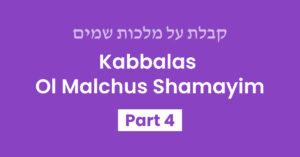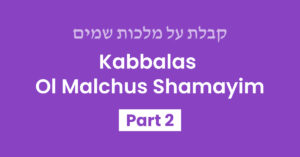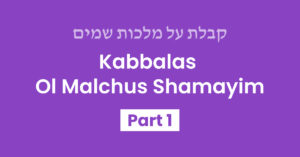As we prepare for Rosh Hashana, we have been learning about Kabbalas Ol Malchus Shamayim. We learned that crowning Hashem as our King means accepting His Will as our #1 priority and being committed to fulfilling His mitzvos at all costs.
We then explained that “fulfilling Hashem’s will” is not just a regular value at the top of a long list of values; rather, fulfilling Hashem’s will is actually the only value that truly exists.
Whenever I have to make a decision in my life, it may seem like I have to take into account what I personally feel like doing, what Hashem wants me to do, and what my friends think I should do… but all these considerations fade away when I remember that Hashem is the ONLY true existence in this world and everything else is dependent on Him. We reaffirm this belief every day when we say the Shema. Understanding and integrating this belief into our lives is a most powerful way to be Mekabeil Ol Malchus Shamayim.
This week, let’s try to understand: Why does Hashem care if we accept Him as King? Isn’t Hashem the King of the universe regardless of what we do or say? Does Hashem really us need our little mitzvos?
Why does Hashem care if we accept Him as King?
A King in a Cave
Imagine that King Louis passes away, and his son, King George, is crowned as his successor. Immediately after the coronation ceremony, King George is whisked away to a faraway island, and proceeds to live in a cave for the next 30 years.
Every day, King George wears his royal robe, holds his royal scepter, and sits on his royal throne. He maintains a fearsome expression on his face and gives long speeches about his theories of leadership and exactly how he would like people to treat him. But nobody hears King George, and nobody sees him. For 30 years, the people live their merry lives and barely remember that King George is their king.
During these 30 years, is King George still considered the king?
Well, officially, yes, he is the king… but what a sad kingship it is! No one remembers that King George is the king, and he has no impact on anyone’s life. No matter how many royal garments he wears and no matter how fancy is his throne, King George’s kingship is not expressed unless he interacts with his people.
This is what Chazal mean when they say: “Ain Melech B’lo Am – There is no such thing as a king without a nation.”1
“Ain Melech B’lo Am – There is no such thing as a king without a nation.”
The same is true with us and Hashem. Hashem always was, is, and will be the King of the universe, as it says: “Adon Olam Asher Malach b’Terem Kol Yitzir Nivra – Hashem is the Master of the world Who reigned even before anything was ever created.”
But like King George sitting alone in a cave, Hashem’s kingship is not revealed unless He interacts with human beings. Without human beings to accept his Kingship and commit to fulfilling His mitzvos, Hashem’s kingship is entirely unknown and hidden in this world.
Hashem’s kingship is not revealed unless He interacts with human beings.
A Yearly Coronation Ceremony
When was the first time in world history that Hashem’s kingship was revealed?
The Sifsei Chaim2 explains that Hashem’s kingship was first revealed on the 6th day of Creation, when Adam – the first man – was created. In fact, Chazal3 teach that Adam was created on the first of Tishrei – the day we celebrate now as Rosh Hashana.
Hashem’s kingship was first revealed on the 6th day of Creation, when Adam – the first man – was created.
Until Adam was created, there was no man to recognize Hashem and fulfill His commands. But once Adam had been created, Hashem’s kingship was no longer hidden. There now existed the potential for a human being to recognize Hashem as his King.
Every year, we mark the anniversary of this glorious day by celebrating Rosh Hashana and crowning Hashem as our King once again. We spend a lot of time in the tefillos of Rosh Hashana proclaiming Hashem as our King and singing His praises. These tefillos give tremendous pleasure to Hashem, because crowning Hashem as our King is the purpose that Adam – and all of mankind – was created to fulfill.
A King Who Bears Insult
Although the day of Adam’s creation was a glorious day for Hashem kingship to be revealed, there is one little problem: Man doesn’t always follow Hashem’s wishes.
When we fail to follow Hashem’s commands, it’s as if we are ignoring the fact that He is our King. It’s a tremendous insult to the king when the people don’t follow his laws.
This is what is means that Hashem is a “Melech Aluv – an insulted King.” Hashem showers us with an infinite stream of goodness – life, health, strength, food, the ability to walk and move. Yet we take all of this goodness and sometimes use our bodies and strengths to rebel again Him. This is a huge insult to Hashem! (Fortunately, Hashem bears this tremendous insult and waits patiently until the sinner does teshuva!4)
Each time we do a mitzvah, we are taking part in revealing Hashem’s kingship in this world. And every time we transgress an aveirah, it is a big insult to Hashem. It’s as if we are ignoring the fact that He is King and do not care about His laws.
Each time we do a mitzvah, we are taking part in revealing Hashem’s kingship in this world.
Your Unique Role in Revealing Hashem’s Kingship
The Gemara5 writes that on Rosh Hashana, every human being passes before Hashem like “Bnei Maron” – like sheep passing through a narrow passageway. The path is so narrow that only 1 sheep can pass by at a time, and each sheep is scrutinized one-by-one.6 On the other hand, the Gemara also writes that on Rosh Hashana we are all judged “B’Sakeera Achas – with one swooping glance.”
The Sifsei Chaim7 explains that these 2 descriptions each represent a different aspect of how Hashem judges the Jewish people.
On the one hand, we are judged as a whole nation (“with one swooping glance”). But at the same time, Hashem judges each of us individually, like the sheep passing through a narrow path.
Hashem judges each of us individually.
Every Jewish soul was created to fulfill a unique role in revealing Hashem’s kingship in this world. For example: Shmuel, a lawyer, reveals Hashem’s kingship by sitting in his sukkah even when it’s hot outside. Reva, a mother of four, reveals Hashem’s kingship by holding back her tongue when she wants to say a sharp remark to one of her kids. Menachem, a 20-year-old yeshiva bachur, reveals Hashem’s kingship by pushing himself to get to minyan even when he’s tired. And Tirtza, a 10th-grader, reveals Hashem’s kingship by getting rid of a skirt that she knows is not really tznius enough.
Like sheep passing through a narrow path, every person is judged according to how much he personally yearns to fulfill his unique role in revealing Hashem’s kingship in this world.
In fact, the Gemara8 teaches that “Moshiach will not come until the treasure house of neshamos (souls) are done coming down into this world.” This means that if every individual Jew would successfully fulfill his role in revealing Hashem’s kingship, then Moshiach would finally come.9
This week, let’s practice reminding ourselves that Hashem needs ME in order for His kingship to be revealed. If we each do our part in revealing His Kingship, then we will hopefully soon see Moshiach and witness the words of the Navi10 being fulfilled: “V’Haya Hashem L’Melech Al Kol Ha’Aretz… On that day, Hashem will reign as King over the entire world; on that day, Hashem will be One and He will be known as One.”
Hashem needs ME in order for His kingship to be revealed.
Sources: [1] Yalkut Reuveini on V’Zos HaBracha; [2] Sifsei Chaim Moadim Vol. I. pg. 144; [3] Rosh Hashanah 27a; [4] Tomer Devorah on “Mi Keil Kamocha”; [5] Rosh Hashana 18a; [6] Rashi ibid.; [7] Sifsei Chaim ibid. pg. 157 [8] Yevamos 62a with Rashi; [9] Sifsei Chaim ibid.; [10] Zecharia 14:9
Your Challenge
Once a day, while (or before) doing a mitzvah, think something like:
“I am doing this mitzvah because Hashem needs MY mitzvah in order for His Kingship to be revealed this in world.”
For example:
- I am about to daven Mincha, and Hashem needs MY tefillah in order for His Kingship to be revealed in this world.
- I am about to say a brachah, and Hashem needs THIS bracha in order for His Kingship to be revealed in this world.
- I am tempted to say these words of lashon hara… but I am going to hold myself back, because this is MY personal opportunity to reveal Hashem’s kingship in this world.
- I am going to wash netilas yadayim, because by fulfilling Hashem’s commands, this is MY personal opportunity to reveal Hashem’s kingship in this world.
Torah Questions
- According to Tehillim 145:13 (Ashrei), how long will Hashem’s kingship last?
- Rashi (Ovadya 1:21) says that Hashem’s kingship will not be complete until a certain nation has been punished. Which nation is it?
- It says in Maariv of Shabbos (before Shemoneh Esrei) that after Hashem split the Yam Suf, Bnai Yisrael accepted Hashem as King upon themselves. Which 1 word is used to describe their attitude – HOW they accepted Hashem as their King?
- According to the Shemoneh Esrei we say in Mussaf of Shabbos, who will be happy with Hashem’s Kingship?
- In which of the Sheva Brachos do we say that Hashem created the whole world for the purpose that we should honor Him?
- During Shemoneh Esrei of the Aseres Yimei Teshuva, where do we say the word “Melech” instead of the usual word “Keil”?
- According to Rashi on Bamidbar 16:19, where was Hashem’s kavod (honor) seen?
Questions to Ponder
- Should we be happy that Hashem is our king? What kind of king would you be happy to have, and what kind of king would you not like to have?
- It says in Maariv of Shabbos that the Jewish people accepted Hashem as their King after He split the Yam Suf for us. How did seeing Hashem split the Yam Suf cause the Jewish people to accept Hashem as king?
- The Midrash says that the trees are happy on Rosh Hashana and Yom Kippur because Hashem comes to judge them. Why do you think the trees are happy to be judged?
- The Zohar says that when Hashem is not in His “regular place,” He is not the king, and when the Jewish people are not in their “regular place” (Israel), we are not princes (children of the king). What do you think this means? Why is our location relevant to Hashem’s kingship?





